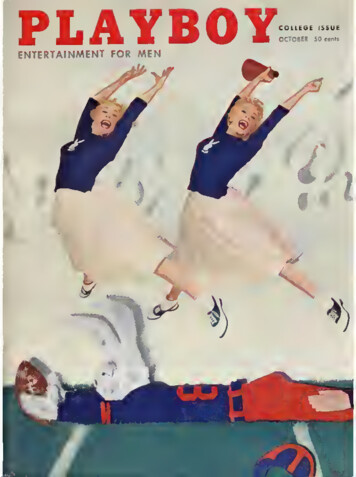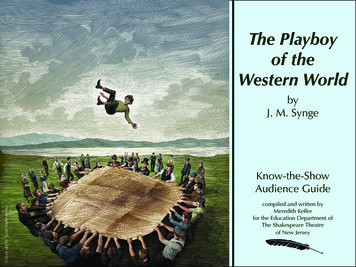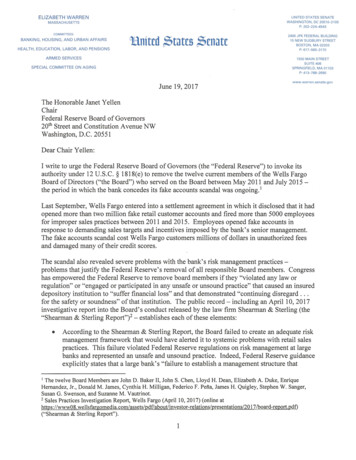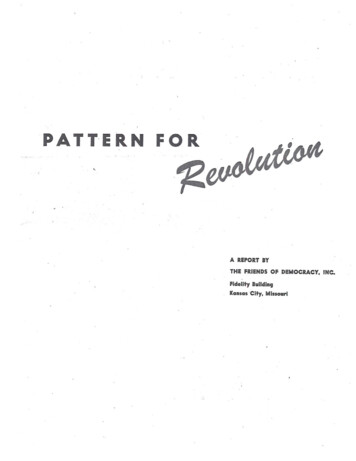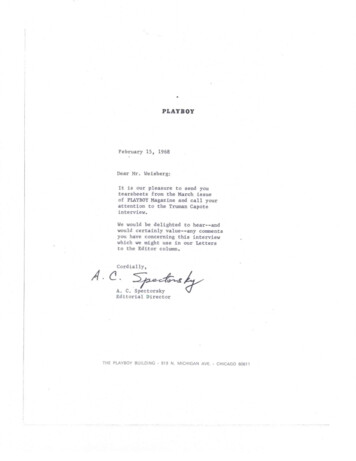
Transcription
PLAYBOYFebruary 15, 1968Dear Mr. Weisberg:It is our pleasure to send youtearsheets from the March issueof PLAYBOY Magazine and call yourattention to the Truman Capoteinterview.We would be delighted to hear--andwould certainly value--any commentsyou have concerning this interviewwhich we might use in our Lettersto the Editor column.Cordially, 5p-e-c-1—46,-1-SA. C. SpectorskyEditorial DirectorTHE PLAYBOY BUILDING 919 N. MICHIGAN AVE. CHICAGO 60611
LAYBOY INTERVIEW:TRUMAN CAPOTEcandid conversation with the outspoken, orchidaceous author of "in)1c1 blood," "breakfast at tiffany's" and "other voices, other rooms"'WEALTHY FARMER, THREE OF FAMILY.1N: H. W. CLUTTER, WIER AND TWOILDREN ARE FOUND SHOT IN KANSASME.- The UPI dispatch below thisitaine, buried in the back pages of thevember 15, 1959, New York Times,newsworthy outside Kansas only beise H. W. Clutter was a former Eisenver appointee to the Federal Farmsdit Board. But in New York City, then had an electrifying effect on novelistamen Capote. Within three days, hein the small western Kansas farm.11 of Holcomb, interviewing friendsI neighbors of the Clutter family andigering local police for informationrut the crime, determined to probeply into the lives of both the Cluttersay and their murderers.It first the diminutive (5'3") Capote,h his exotic European clothes andh-pitched voice, was viewed askancelocal residents, who often demandedsee his meager credentials—a letter ofommendation from the president ofwas State University and a batteredS. passport blackened with visas forr 30 nations. Nor was Capote, a der; of the jet set, initially at home onplains of Kansas. "It was as strangeme," he said later, "as if I'd gone tosing." But townspeople and police:a soon warmed to the effervescentand for the next five and a half years,'ter three years of work on 'in Cold-od,' I almost abandoned it; I couldn'tid the morbidity. It was becoming a!scion of survival; but I forced myselfbush the damned thing through."he relentlessly investigated the lives ofthe Clutter family and the two men convicted of (and eventually executed for)their murder—Richard Hickock and PerrySmith, who became his close friends.Capote's research was exhaustive—and exhausting. "I wrote 6000 pages ofnotes before I ever sat down to write thebook," he says. Everyone even remotelyconnected with the case was interviewedin depth, and no aspects of the lives ofthe Clutters or of their killers escapedCapote's scrutiny. The result was "InCold Blood," a 343-page "nonfictionnovel"—Capote's own term—publishedby Random House in January 1966. Aninstantaneous critical and commercialsuccess, the book soared within twoweeks of publication to the top of thebest-seller list, where it remained forover a year. In the process of selling800,000 copies in hard cover and over2,500,000 in paperback—in America alone—it became one of the biggest moneymakers in publishing history. Translatedinto 25 foreign languages (including Hebrew, Catalan, Afrikaans and Icelandic),it has already earned Capote over 3,000,000, including 500,000 for movierights. (See PLAYBOY'S review of the filmversion in this month's "Playboy AfterHours.")The author was even more pleased bythe book's rave reviews than by its re-"A re !here any writers on the literaryscene whom 1 consider truly great? Yes—Truman Capote. But there arc otherswho. while not quite in this exalted orbit,are still commendable."sounding commercial success. The icons ofthe literary establishment, who for yearshad merely tolerated Capote or, like Herbert Gold, dismissed him as "one of thechattering poets of decoration," now calledhim a towering figure in American letters. "Remarkable, tensely exciting, moving, superbly written," hailed The NewYork Times. "A masterpiece .spellbinding work," echoed Life. "Thebest documentary account of an American crime ever written," declared TheNew York Review of Books. "One ofthe stupendous books of the decade,"panegyrized London's Sunday Express. Nobook in recent years had been so widelyand so lavishly praised.Drowned out by the cheers were afew restive murmurs of dissent. Reviewing "In Cold Blood" for New Republic,critic Stanley Kauffinann wrote: "It is ridiculous in judgment and debasing ofall of us to call this book literature. Arewe so bankrupt, so avid for novelty that,merely because a famous writer produces an amplified magazine crime feature, the result is automatically elevatedto serious literature?" Novelist Mary McCarthy derided the claim that Capote hadinvented the nonfiction novel andcharged that his "greatest contribution toliterary innovation was to publicize theauthor first, the book second."Capote has always been a lightning"Murderers almost always laugh whendiscussing their crime. They'll tell youhow they cut someone's throat and it'sas if they were watching a clown slip ona banana peel."51
IN rod for controversy. Born Truman Streckfus Persons (he later changed hissurname legally to that of Iris mother's second husband) in New Orleans onin September 30, 1924, Capote was four when his mother divorced a travelingsalesman and packed her unwanted son off to live with three elderly aunts inAtMonroeville, Alabama. hi the followingyears, lie shuttled among various relatives throughout the rural South, seldomseeing his mother and completely out oftouch with his father. Perhaps as an anodyne for parental rejection, he retreatedinto an inner world of fantasy anddreams. A precocious child, he began hiswriting career at the age of eight, and attwelve won first prize in a literary contest with a short story titled "Old Mr.Busybody."Capote dropped out of school at 17and, after a brief stint as protege' of afortuneteller. he traveled to New Yorkand got a clerical job at The NewYorker; originally hired by the accounting department, he confessed after oneday that he could not add and was transferred to the art department. But his literary talents were soon recognized andhe graduated from cataloging cartoons towriting items for "The Talk of theTown" department. He also found timeto moonlight as a movie-script readerand to grind out free-lance anecdotes fora popular digest magazine. That sameyear, he wrote his first piece of publishedfiction, and at 19 wan the 0. HenryPrize for a short story called "Miriam," aschizophrenia-tinged tale about a mysterious child who enters the life of amiddle-aged woman and slowly destroysher. All of Capote's early work dealt, ascritic John K. Hutchens puts it, with a"macabre, isolated world of shadowycharacters in flight from sundry terrors."By 1948, a series of such stories hadwon him nieces d'estime within theworld of letters, but he was still unknown to the general public. Then hisfirst novel, "Other Voices. OtherRooms," was published and Capote became an overnight celebrity. The NewYork Herald Tribune called the book"the most exciting first novel by a youngAmerican in many years," and critics began to compare its author with NormanMailer, Irwin Shaw and Gore Vidal—the brightest literary lights of the earlypost-War period. Overshadowing thepaeans, however, and perhaps as responsible for the book's success as its luminousprose, was the photograph of Capote onthe dust jacket. Gazing limpidly outof a thousand bookshop windows at apublic alternately beguiled, outraged andamused was a portrait of Capote reclining on a couch, fastidiously attired in atattersall vest and black bow tie, blondbangs dangling over his forehead, full lipsmoist and pouting. Critic George Davisquickly dubbed him "the perverted Huck52 Finn of American Letters." Thus wasCapote stamped indelibly with the imageof a decadent, orchidaceous aesthete.As the years passed, his florid personallegend grew apace with his reputation asa writer. "Other Voices, Other Rooms"was followed with a string of equallysuccessful, if less controversial, books."A Tree of Night," an anthology ofeight hauntingly evocative short stories,appeared in 1949 and was followed to1950 by "Local Color," a collection ofperceptive and civilized travel piecesthat marked Capote's first literary departure from the shadowy borderland between dream and reality. "The GrassHarp," his second published novel(1951), once more reflected Capote'spreoccupation with the world of childhood but evidenced a new feeling of human warmth and a life-affirming faith.In 1956, Capote unveiled yet anotherdimension of his evolving talents withthe publication of "The Muses AreHeard." a bitingly witty documentaryaccount of his trip through Russia withthe touring company of "Porgy andBess"—and the precursor of his preoccupation with journalism. In 1958 came"Breakfast at Tiffany's," his celebratednovella about Holly Golightly, the wistfully whimsical demimondaine subsequently immortalized on film by AudreyHepburn. Capote adapted "House ofFlowers," another story from this period,for the stage; it was a flop—but a revised version opened on Broadway earlythis year. In 1963, Capote's "SelectedWritings" appeared—again, to mixedreviews. But the critics' objections didn'ttrouble Capote; he was then almost halfway through his most monumental work,"In Cold Blood."In the years since then, Capote's stature as a world-acclaimed author has wonhim entree to the salons of internationalsociety, and he reciprocated on November 29, .1966, by throwing a gala—andwidely reported—masked ball for hisfriends. Among the several hundredintimates who packed the Grand Ballroom of the Plaza Hotel were Rose Kennedy, Princess Lee Radziwill, Mrs.Steams Niarchos, Lynda Bird Johnson,Mr. and Mrs. Henry Ford II, Princessd'Arenberg, Countess Gianni Agnelli,Alfred Gwynne Vanderbilt, MargaretTruman Daniels, Countess Rudi Crespiand Undersecretary of State NicholasKatzenbach.Capote, who has never been accusedof modesty, forthwith accepted ElsaMaxwell's guttering torch with grace:"I'm an absolute social smash," he announced. Though he has been called asnob, members of his self-styled court arenot selected on the basis of their standingin "Burke's Peerage" or with Dun andBradstreet; beauty, wit and elegance arehis criteria. Nor are Capote's courtiers,who range from royalty to Long Islandpotato farmers, drawn to him because ofhis reputation as a best-selling author. AsSuzy Knickerbocker, guru of the gossipcolumnists, puts it: "An his friends likeand love him—not because he's a bigliterary lion, not because it's the thing todo, but because Truman is Truman. . ."To discover what snakes Truman Truman and to fathom the complexities andcontradictions of the man and the artist,PLAYBOY interviewed Capote at his NewYork residence, a five-room co-op on the22nd floor of the luxurious new UnitedNations Plaza apartment building, amillionaire's mecca (Capote's next-doorneighbors: Senator Robert F. Kennedyand Johnny Carson). Capote does thebulk of his writing at a two-house estatein Bridgehampton, Long Island; he alsomaintains a home in Palm Springs, California, and a mountainside villa in Ver.bier, Switzerland, but does most of hisentertaining—and grants most of his infrequent interviews—in his New Yorkapartment, surrounded by a collection ofturn-of-the-century Tiffany lamps, animalbibelots, antique paperweights and yellowing photographs. Now 43, Capote isno longer the fey youth on the dust jacketof "Other Voices, Other Rooms": Hisblond hair is thinning, his jowls are fullerand the years have traced fine lines abouthis eyes. But at our first interview session,as he uncorked a bottle of French champagne—his refrigerator holds little else—and settled himself, scruffily accouteredin T-shirt, windbreaker and sunglasses,on a window seat overlooking a view ofthe East River, the impish enfant terribleof 20 years ago seemed not so far away."Have at me," Capote commanded in hislilting, near-contralto voice. PLAYBOYinterviewer Eric Norden began by askinghim about that other self.Do you think the public's ;mi.tial image of you as a kind of literaryAubrey Beardsley helped or hinderedyour career?CAPOTE: It certainly didn't do me anygood in official academic circles, butthen, I never cared about all those graypeople with their drab quarterly reviews.On the other hand, a number of peoplewho were concerned about my welfareand my emerging career did feel thatthis image harmed me, since many in theliterary establishment were bound to resent my eccentricities and mannerismsand to feel that I received far too muchpublicity for a serious writer. But it's nottrue, as so many people seem to think,that I did a great deal to encourage thisimage in an effort to build an "atmosphere" around myself. From the beginning, I've never done anything but try tobe myself and go my own way. I thinkthere are certain people who have anatural charisma that generates publicawareness and interest. You have it oryou don't; and if you don't have it, there'snothing you can do to create it. For better or worse, I've had this charisma fromPLAYBOY:
start: and I can't say whether it'spet or hurt me. It all depends onether you think fame is an asset or a'draftee in an artistic career. I feelher indifferent about the whole thing,then, I've been in public life overyears now, and you become neutralnit publicity. I never pay attention toat people write about me anymore. Ites a lot to make my pulse skip a beat.YBOY: The image that grew upand Ernest Hemingway—big-gametiter, bullfight aficionado, beltingiskey and swearing like a stevedore; just the opposite of your image, ast once described it in Paris to Artchwakl: "fragile and aesthetic . alugh I'm not that at all." Do you thinkt in both cases the image may haveded to obscure the real man and hisrk?Km: Yes, in both instances the mytherroneous and almost comically ans.ding. I am secretly several of thengs the hairy one pretended to be. Buti't expect me to elaborate on that'hitless curious-sounding statement, foroperative word is secretly.MOT: Despite—or perhaps because ofour famous dust-jacket photo onkey Voices, Other Rooms, you becameinstantaneous literary celebrity. Howall th
man and to fathom the complexities and contradictions of the man and the artist, PLAYBOY interviewed Capote at his New York residence, a five-room co-op on the 22nd floor of the luxurious new United Nations Plaza apartment building, a millionaire's mecca (Capote's next-door neighbors: Senator Robert F. Kennedy and Johnny Carson). Capote does the
